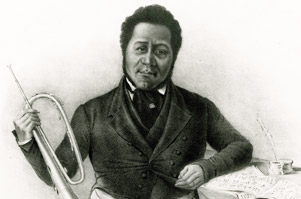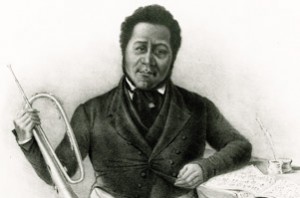
It’s Friday, the end of the work week and the start of the weekend.
This week’s open threads highlighted little known or interesting black history facts in celebration of black history month.

FACT 1: In 1804, Lemuel Haynes is the first African American to receive an honorary degree in U.S. history when Middlebury College awards him a Master’s Degree at its second commencement.
FACT 2: In 1810, The U.S. Congress prohibits African Americans from carrying mail for the U.S. Postal Service.
FACT 3: Andry’s Rebellion on January 8-11, 1811. A slave insurrection led by Charles Deslondes, begins on the Louisiana plantation of Manual Andry.
Named after the owner of the plantation where the event originated, the revolt of 400-500 slaves in the parishes of the Andry plantation caused uproar in New Orleans. Led by a Saint Domingue slave named Charles Deslondes, the uprising was built on the fear generated by the Haitian Revolution of 1791, coupled with the large population of free Negroes to further accentuate the tension in New Orleans.
General Wade Hampton assembled two companies of volunteers, and eventually with the additional help of a regular army troop the disturbance was put down, requiring the service of nearly 700 soldiers. By the end of the day, the rebels had murdered two whites and eighty-two rebels were killed in retribution, making the suppression of this revolt the bloodiest in the history of the country. After hanging the heads of some of the guilty on poles in New Orleans, authorities tightened the restrictions governing the activities of free blacks, and a few loyal slaves were emancipated.
FACT 4: In 1817, Francis Johnson of Philadelphia becomes the first black bandleader and composer to publish sheet music. In 1837 he becomes the first American to perform before Queen Victoria in England.
Francis Johnson, musician, composer, and bandmaster, was born in 1792 in Martinique in the West Indies and immigrated to Philadelphia in 1809 at the age of 17. By that point he had already mastered the keyed bugle and the violin. By his early 20s he was building a reputation as a bandleader in Philadelphia and southeastern Pennsylvania.
Johnson gained greater popularity after music publisher George Willig published his Collection of New Cotillions in 1817. This was the first instance of a black band leader having his musical compositions published. By 1818, 26-year-old Johnson had become a leading dance band conductor for Philadelphia’s high society. During the 1820s, Johnson’s band performed at the city’s most popular dance venues at schools, private parties, and balls. Prominent military regiments like the Washington Guards Company Three Band and the State and the First Troop Philadelphia City Cavalry also hired Johnson’s ensemble. He personalized his performances by experimenting with different instrumentations, strings, and winds.
During his prolific career, Johnson composed over 200 musical arrangements in various styles including cotillions, operatic airs, ballads, quadrilles, patriotic marches, quicksteps, and other forms of ballroom music.
Besides serving the musical taste of the white public, Johnson also performed spirituals at African American churches in Philadelphia, Boston, and New York. One of his most memorable musical performances occurred in 1841 when he collaborated with Morris Brown, Jr., one of the leading black ministers of the era, to perform Haydn’s Creation at the First African Presbyterian Church in Philadelphia. Johnson’s band also shared the spotlight with other black bands in Philadelphia including those led by James Hemmenway and Isaac Hazzard. Nonetheless his was the most popular black band of the era.
Besides having the distinction of being the first black American composer to have his arrangements published as sheet music, Johnson was also the first African American bandleader to conduct public concerts and in 1837 he led the first American ensemble to perform before Queen Victoria in England. Johnson was also the first black musician to perform in integrated musical events in the United States, and the first musician to introduce keyed brass instruments to American bands. Johnson left numerous manuscript and piano transcriptions.
Francis Johnson died in 1844 in Philadelphia after a lengthy illness at the age of 52.
FACT 5: In 1818, Thomas Day of North Carolina is considered the first widely known furniture and cabinet maker in the United States.
*** Information courtesy of Blackpast.org***
